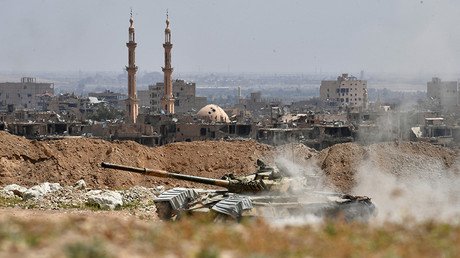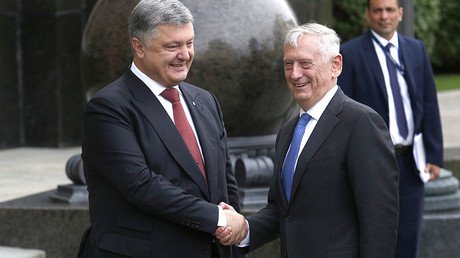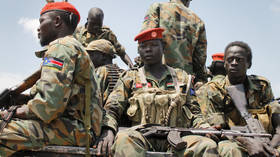Losing in Syria, the US will target Russia more than ever

The spectacular victory this week for Syrian state forces and allies liberating Deir ez-Zor portends an end to the war. But celebrations should be tempered by the realization that the enemies of Syria will shift their agenda for conflict elsewhere.
If we segregate the many protagonists in Syria’s conflict, the two main rivals to emerge from the melee are the United States and Russia. Russia may have gained the upper hand in Syria. But, ironically, winning the peace in Syria may unleash wars elsewhere.
Reports that US military forces have been airlifting insurgents out of harm’s way in Syria suggest that Washington is saving its terrorist assets to fight another day, perhaps in some other unfortunate country targeted for regime change.
The six-year war in Syria was never really about Syria alone. It was but a battlefield in a global war for dominance by the US and its allies. Syria was only one of many countries where the US has sought to establish its suzerainty through war for regime change.
When Russia stepped in to defend its Syrian ally at the end of 2015, that was the game-changer. Up till that point, the government of President Bashar Assad looked decidedly precarious, as mercenary proxies backed by the US and its allies homed in on the goal of regime change.
The liberation of Aleppo last December and this week of the eastern city of Deir ez-Zor by the Syrian Army backed by Russian air power have heralded the final defeat of the foreign-sponsored war against Syria. However, that is not the end of the affair.
For months now, the US and its NATO and regional partners have realized that the game was up in Syria. Syrian President Assad recently disclosed that foreign funding for the anti-government militants had dried up. A key marker was the closing down two months ago of CIA support operations for militants in Syria by President Trump.
With the fall of the US-led war for regime change in Syria, the various foreign co-conspirators are scrambling to realign their interests.
Russia is emerging as the kingpin in the Syrian situation. Turkey is reportedly giving full support to the Russian-brokered peace talks to resume in Kazakhstan’s capital, Astana.
French Foreign Minister Jean-Yves Le Drian was in Moscow this week, where he announced in a press conference with Russian Foreign Minister Sergey Lavrov that Paris was no longer demanding President Assad to stand down. Quite a change from predecessor Laurent Fabius’ view, expressed repeatedly, that “there was no place on Earth for Assad.”
France, like Turkey, realizes that their best bet now is to dive into peace talks in the hope they can influence the final settlement with some dividend.
Meanwhile, Saudi Arabia is supplicating Moscow to exercise its newfound authority in Syria in such a way as to curb Iran’s influence. Iran, along with Lebanon’s Hezbollah, was also key to Syria’s military success against the foreign-backed jihadist proxies. The Saudi rulers know the writing is on the wall for the US-led war against Assad. Last month, the Saudis reportedly told the various terrorist groups in Syria that the bankrolling was over.
READ MORE: Russia & Saudi Arabia say de-escalation zones in Syria an important step forward – Lavrov
What the Saudis are focused on now is the bigger picture of confronting Iran, which they see as their nemesis in the region.
Israel, too, backed the wrong horse in Syria, and like the other sponsors of the regime-change agenda, it is keen to shore up its losses. The surprise visit by Israeli PM Benjamin Netanyahu to Moscow at the end of last month was motivated by his alarm over Iran’s robust position gained in neighboring Syria.
The Israeli air strike this week in Syria (allegedly from Lebanese airspace to avoid Russian S-400 missiles) can be best understood as a knee-jerk act of revenge for the Syrian Army’s breakthrough victory at Deir ez-Zor.
Syrian political commentator Afraa Dagher wrote that the US, Israel, and the other regime-change conspirators had hoped to split the central authority of Assad by making Deir ez-Zor “a Berlin” – a symbolic splintering of the country.
Although the Syrian government is substantially regaining control over all its territory – with reports over the weekend of the army pushing on to liberate more territory – one cannot discount that the foreign enemies have given up their nefarious agenda entirely.
The intensified US aerial bombing of the northeast city of Raqqa and its support for Kurdish militia harks to the same objective of carving up Syria’s territorial integrity, with a view to undermining the authority of the Assad government in Damascus.
While the foreign enemies of Syria do seem to have resigned to accepting defeat in their objective to overthrow Assad, the country will still be subject to troublesome external interference. The Turks and French will no doubt try to stick their oars into the political process to sway the outcome. The Saudis and Israelis will shift their animosity toward Iran in some other way which will likely involve further violation of Syrian sovereignty.
As for the United States, and its trusty British bulldog, the agenda in Syria was always about the macro picture of exerting global dominance with regard to perceived rivals of Russia, China, and Iran. The US has incurred a serious setback in Syria. No doubt about it. Russia can be said to have won, and for a while is the kingpin, as the war-torn Arab country begins to reconstruct.
But we can expect new battlefields to emerge in the US struggle for hegemonic control.
The flared-up crisis over North Korea’s nuclear weapons program seems more than a coincidence with the stifling of American ambitions in Syria. Washington’s gung-ho approach to North Korea has served to destabilize the region and given the US a perfect cover for expanding its strategic forces on the far-east borders of China and Russia.
In Ukraine, the US is recklessly destabilizing that conflict further by moving to supply the Kiev regime with lethal weapons. Russian President Vladimir Putin has warned of escalating violence and the scuppering of any hope for a peaceful settlement if the US proceeds with its plans to arm the Kiev regime.
Winning the six-year war in Syria is a seminal strategic victory for the Syrian people and their allies, primarily Russia, thanks to Putin’s courageous decision to intervene nearly two years ago.
The US and its partners-in-crime against Syria are licking their wounds.
Nevertheless, the US agenda of global hegemony and “full spectrum dominance” will not stop there. We have to understand the Syrian war as being just one front in a range of global fronts for the US to violently assert its power ambitions. That incorrigible dynamic stems from the inherent nature of US capitalism and its imperialist form.
Russia is helping to win the peace in Syria despite a six-year criminal onslaught led by the US, Britain, France, Turkey, Israel, Saudi Arabia, and others.
But this is perhaps the precise time when war will erupt somewhere else. All the more so because Russia has spectacularly defied the American global bully in Syria.
The statements, views and opinions expressed in this column are solely those of the author and do not necessarily represent those of RT.

















